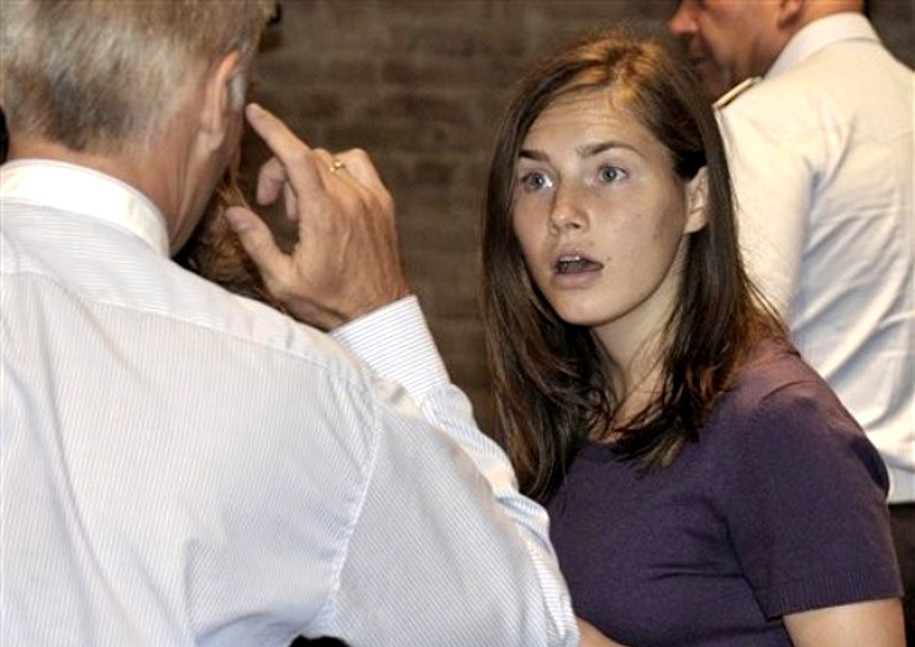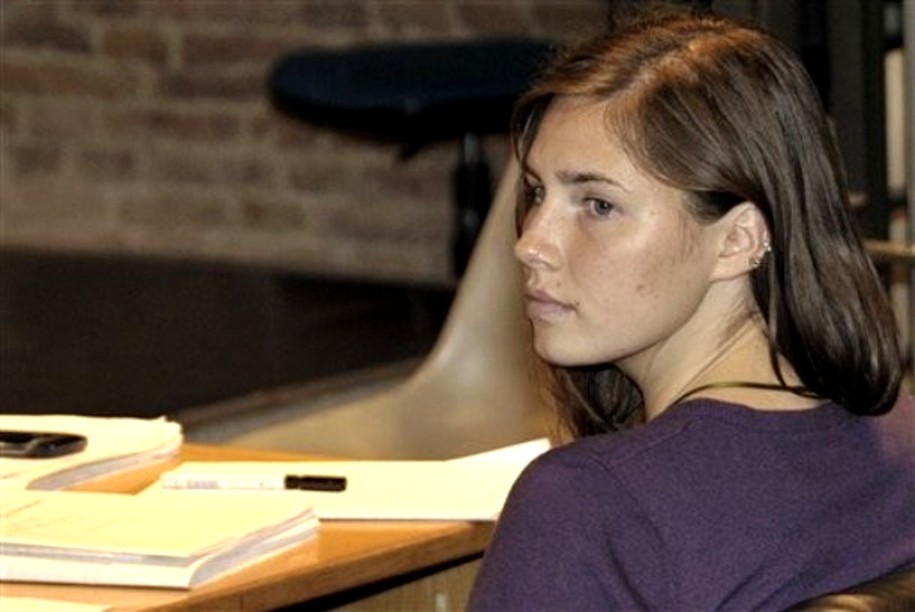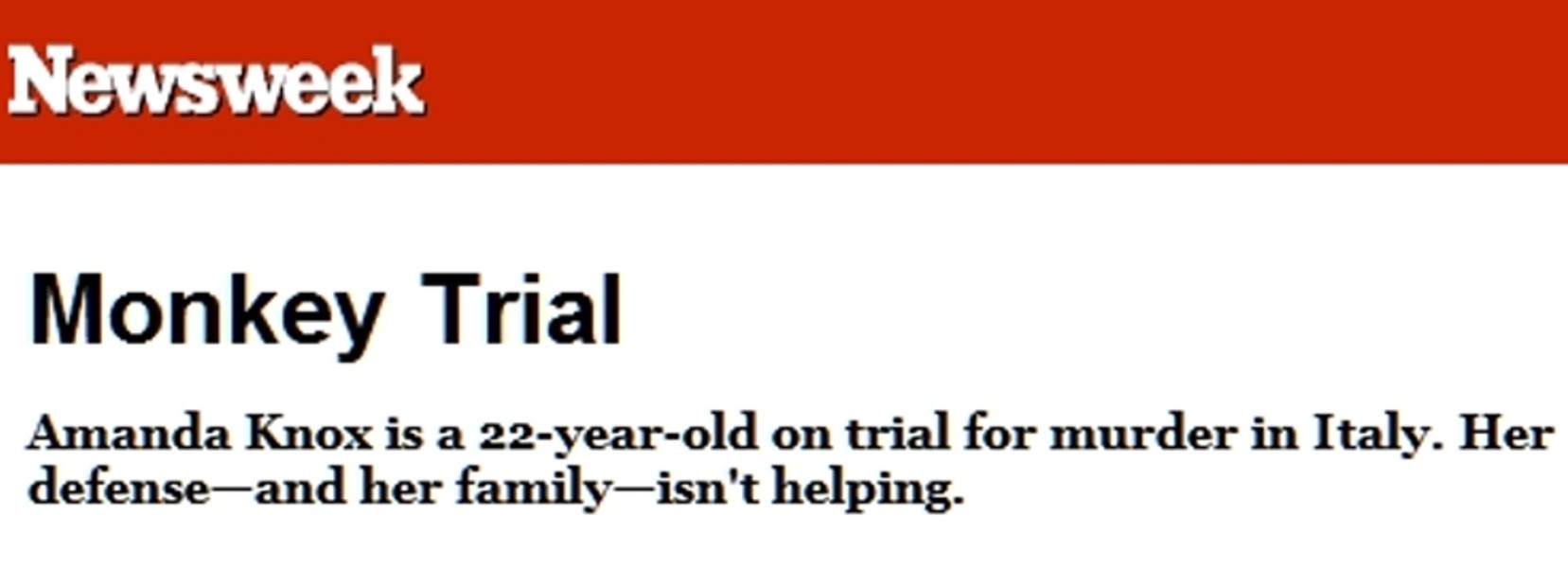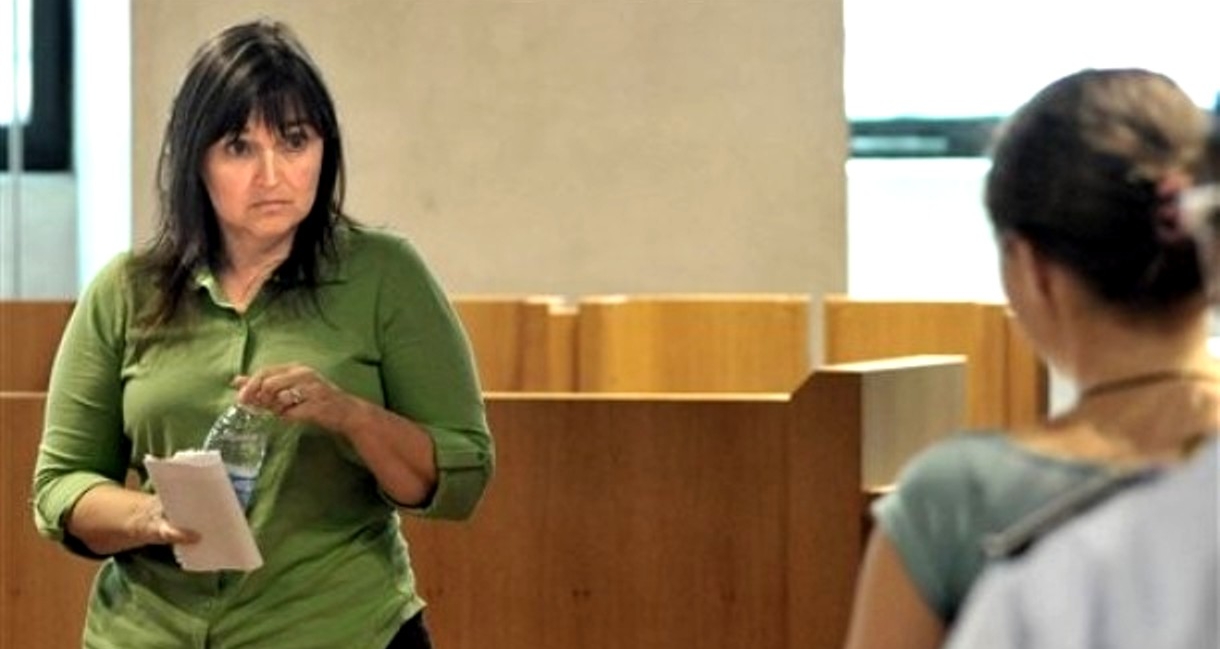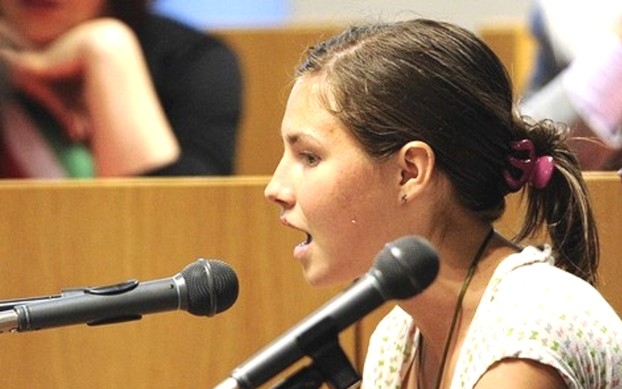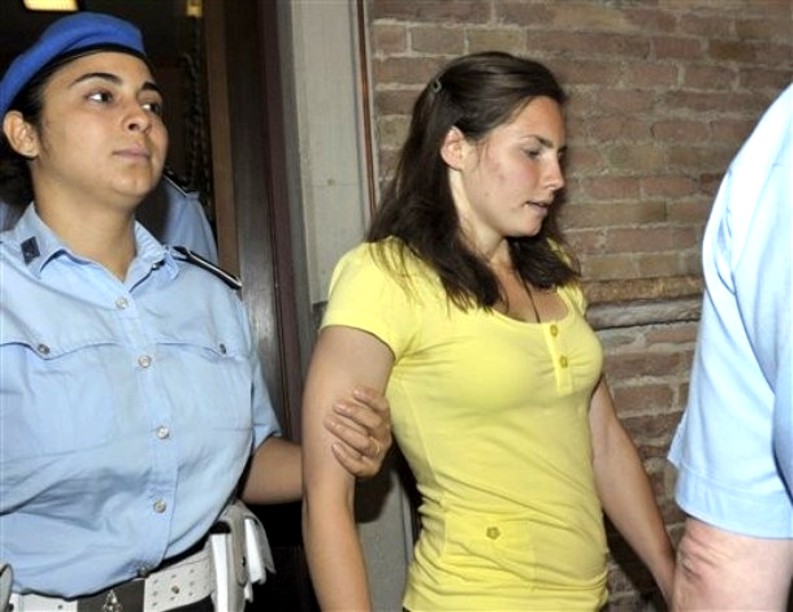
Category: Amanda Knox
Monday, October 05, 2009
Seattle: The University Of Washington’s Surprisingly Pretty Main Campus
Posted by Peter Quennell
As we have been showing, this very sad tale is playing out in a number of beautiful locations.
We’ve had many photo spreads on Perugia and various other places in Italy, including where Sollecito came from, and spreads on Meredith’s exiting hometown of London and her spectacular university town of Leeds.
Now we turn to Seattle.
Amanda Knox came from West Seattle, a very large and surprisingly high plateau south-west of the downtown of Seattle, and she studied for two years at this university several miles north-east of the Seattle downtown.
The top shots here are the most significant from Knox’s perspective, for they are the libraries and lecture halls she would have frequented almost daily. The other shots show other departments and some of the attractive landscaping where she might have sat out with friends.
Why surprisingly pretty? Well, this is a publicly funded American university run by the State of Washington and the public universities, while often very good, can be mind-numbingly utilitarian.
This is not a private Ivy League institution like Harvard or Stanford or Princeton or Yale. But it sure looks like one of them.
As always, click for the larger images.
Tuesday, September 15, 2009
New York’s The Daily Beast Reports Knox’s Lawyers Preparing Her For A Guilty Verdict
Posted by Peter Quennell

[click above for a larger image]
Barbie Nadeau reports on the fallouts from yesterday.
On a mistrial for the withholding of some of the DNA evidence.
Denied their request for a mistrial due to mishandled evidence, Amanda Knox’s lawyers promise “bombshells” in the murder trial””but prep her for a guilty verdict….
The defense requested that the indictments against Knox and her co-defendant, Raffaele Sollecito, be thrown out””essentially asking for a mistrial….. But the request proved futile.
After more than an hour of deliberation, the judge ruled that the trial should go on as scheduled, dealing a crushing blow to the defendants. Even though the defense’s gambit was a legal long shot, the lawyers hoped that, at very least, it might have triggered a mistrial….
Although the defense’s request was denied, they risked nothing by making the request. In fact, the judge’s denial could set the stage for an appeal if the two are convicted. In Italy, an appeal is an automatic part of criminal trials.
And on the down-to-the-wire situation triggered by Guede’s appeal dates.
Rudy Guede, who was convicted for his part in Kercher’s murder, is appealing his guilty verdict, and the race is on now to finish the Knox trial before his appeal begins November 18.
Because his appeal is pending, Guede chose not to testify in this trial, but anything he says at his own appeal hearing can be considered as evidence in the Knox-Sollecito case””and Guede has indicated several times that he was in the house when Kercher died but that he did not kill her.
He has said through his lawyer that Knox and Sollecito were also there that night.
Guede has several times hinted that in his appeal that he will finally tell all. Presumably a self-serving version, but we suspect any confession might be much-hoped-for by Meredith’s family and her Perugia friends.
We have heard conjecture that Guede offered to tell it like it really was at the present trial of Knox and Sollecito but the prosecutors rejected a deal. Perhaps feeling that his proffered version then did not add very much to what they felt was an already-strong case. And seeing no reason why Guede should not serve his full 30 years.
If Rudy Guede does now finally tell all, we sure hope that he does know the meaning of “all”.
Wednesday, August 19, 2009
Case For The Prosecution #4: Amanda Knox’s Multiple Conflicting Alibis
Posted by The Machine
The Knox Alibis: How They Conflict
The first three posts on the power of the case were on the DNA evidence, the luminol-enhanced footprint evidence, and Raffaele Sollecito’s various conflicting alibis.
Now we look at the various conflicting alibis that Amanda Knox has given for the night in question. We dont yet have full transcripts and have to rely on what was reported in the UK press.
Please click here for more
Friday, August 07, 2009
Where Sollecito, Knox And Guede Are Now, Sitting Out The Heatwave
Posted by Peter Quennell
Knox is still at Capanne, Sollecito is back at Terni, and we believe Guede is still at Viterbo.
Knox is probably having the toughest time of it right now. Since it was opened several years ago, Capanne had never seen much more than half of the prisoner population it was built for.
Now it is suddenly full to capacity, as a large number of prisoners has just been moved in from over-crowded facilities elsewhere. In fact, it is possible that the women’s wing is full beyond its rated capacity.
Sollecito was in the very modern solar-heated Terni for most of last year. He was moved back to Capanne this year just before the trial, amidst his loud complaints that Capanne lacks the internet connections for his computer-science homework.
Sollecito has just received word that he failed the virtual-reality entrance exam that he took at Verona University last March. When he was being transported there in a police van for the exam, he was yelled at by an angry crowd when the van stopped at an autostrada rest-stop for what Americans call a bathroom break.
He was bundled back in, and the police van took off in a hurry. No bathroom break? That must have rattled his exam-taking composure, that is for sure.
Guede is in the sex-offenders wing of Viterbo - all three were charged with a sex crime, and Guede was convicted of one. Sex-offenders’ wings have a heavy stigma over them for obvious reasons, but they can be quieter and less prone to violence than the main wings of prisons.
Being taught a trade seems a given in all Italian prisons so that when the perps re-enter society they can be employed fast and become useful.
Friday, July 17, 2009
Trial: Seemingly A More Serious And Somber Defendant In Court Today
Posted by Peter Quennell
[click for larger images, courtesy AP]

Thursday, July 16, 2009
Attitudes Seem Hardening In Italy Against Knox Campaign And Defense
Posted by Peter Quennell
Increasing negativity is now being reported.
Lack of respect for the victim and for the police, investigation, prosecution, and in some respects Italy itself, do seem not to be paying off. Some of our commenters in the posts below suggested that the behavior and attire of Knox’s family in Perugia seemed a seriously wrong move.
Our posters and readers in Italy and the Italian media report pretty much the same perception. In Perugia amd Italy generally, sympathy and goodwill seem perilously close to empty. Now Newsweek reflects this deteriorated situation.
1) On behavior around Perugia, attire in court, and those photographs.
There should be a basic set of rules when on trial for murder: Don’t antagonize the prosecutor and judge. Dress appropriately in court. Don’t let your family pose for photos in front of the crime scene…
Two weeks ago, Ashley Knox defied the prohibition on minors attending sex-related hearings and had to be removed from the proceedings. Then Deanna Knox showed up in a red, white, and blue ensemble, complete with hotpants, on July 4.
2) On the strength of the case the prosecution presented
The prosecution took five months to make its case, which relied heavily on circumstantial evidence, including Knox’s lack of alibi, her behavior after the murder, and contradictory statements she and her co-defendant, Rafaelle Sollecito, made during questioning.
Newsweek quotes Alessandra Batassa, a Rome-based criminal lawyer who defends murder suspects, as saying that Italian courts have handed down guilty verdicts on less evidence than this. And an unnamed Perugia judge is quoted as saying “Lies can discredit the suspects as much as hard evidence.”
3) On the muddled wrapping-up of the defense part of the case
The Knox-Sollecito defense team plans to wrap up their case this weekend even though they have presented only a handful of witnesses. Knox’s original witness list contained 35 names but defense lawyers have retracted 23.
Sollecito’s chief forensic consultant walked away from the case (and stuck lawyers with a 50,000 euro bill) in May because he disagreed with the defense strategy.
The witnesses who actually testified for the defense caused even more confusion: two forensic scientists placed on the stand contradicted each other. (Sollecito’s expert told the jury that Kercher was killed by a single assailant from behind; Knox’s said Kercher was killed from the front.)
Among the lawyers, chaos reigns: Sollecito’s lead attorney, a parliamentarian in Prime Minister Silvio Berlusconi’s party, has not been in court for weeks, and his other two attorneys have dismantled their joint practice during the course of this case.
4) And on very important prosecution evidence still uncontested
Nobody has testified about Knox and Sollecito’s whereabouts that night. Nor has the defense broached the topic of the mixed DNA in the bathroom the girls shared. Legal experts who follow this case have suggested that blood evidence cannot be dated and therefore could have been left weeks before the murder.
But when Knox testified in her own defense in June, she conceded that there was no blood in the bathroom the day before the murder, effectively dating those blood stains to that night.
Sunday, July 05, 2009
Why Defendants Mostly DONT Testify? Those Devils That Lurk In The Details
Posted by FinnMacCool
Preamble
We have always pressed very hard for the truth to come out. WHY did poor Meredith have to die? And why and how in such a cruel and depraved way?
It now looks almost overwhelmingly certain that the truth did NOT come out when Amanda Knox took the witness stand in the court on 12 and 13 June.
No media organization seems to have made even the slightest effort to analyze Amanda Knox’s testimony, to see if it hangs true with past statements and known timelines.
But the judges and jury will do this for sure.
We have also begun to cross-check the testimony, and the first results look quite devastating for the defense.
1. A phone call before dawn
The phone is ringing in Seattle. Edda Mellas wakes up - it is long before dawn, on a Friday morning early in November. (To be precise, it is 0447 on November 2, 2007.)
Her daughter is calling from Italy - Amanda doesn’t usually call at this hour, she’s usually more careful about time zones.
Speaking to ABC’s 20/20 show a few weeks later, Edda described the content of that call as follows:
[Amanda] goes, “I’m back at my house, and I want you… first I know I’m okay.” And I said, “Okay, you know, what’s goin’ on?” And she said, “Well, I was at Rafael’s last night… and I’ve come home now and I think somebody’s been in my house…” And she told me, “We can’t find Meredith. We can’t get a hold of Meredith. And her room is locked.” And I said, “Hang up and call the police.”
Phone records show that the call lasted a minute and a half. Amanda is concerned enough to wake her mother before five in the morning. First, she reassures her mother that she herself is okay. She explains what will later become her alibi for the murder of Meredith Kercher - that she spent the night at Raffaele Sollecito’s apartment.
Then she explains why she is calling in the middle of the night - there are signs that someone has been in the house, that Meredith’s door is locked, and that she and Raffaele have been unable to make contact with Meredith.
Edda’s reply is simple, and plainly it is good advice: hang up, and call the police.
Phone records show that a minute and a half after this call ended (at 1250) Raffaele made a call to his sister Vanessa, who is a lieutenant in the carabinieri.
We don’t have too much detail about the content of this call (since Vanessa hasn’t testified and Raffaele is exercising his right to silence) except that it appears to have been similar to Amanda’s call to her mother. Raffaele briefly explains the problem at the cottage and Vanessa advises him to call the police.
A minute later, Raffaele calls the police. After a phone problem - he has to call back after being placed indefinitely on hold - he calls them a second time and explains the problem. Since these calls were recorded, we know exactly what was said.
Raffaele claims that someone has broken into the house through a broken window and caused a lot of disorder. There is a lot of blood, but nothing has been stolen, and the main problem - as he sees it - is that there is a locked door. The police say that they will send a patrol to verify the situation.
Edda’s testimony, supported by the police and phone records, shows a straightforward link from the call she received at 0447 Seattle time (1247 in Perugia) to the calls that Raffaele makes to his sister (1250) and the police (1251 and 1254). That whole process takes just eight minutes.
At 0524 (1324 in Perugia), Edda receives a second phone call from her daughter. Amanda explains that the police have now arrived and found Meredith’s dead body.
2. Two days later: an email
The murder makes the international news. Several phone calls follow. Over the weekend, Amanda is one of several people being interviewed by the police, alongside others who knew Meredith, or who arrived at the crime scene before the discovery of the body.
At home in Seattle on Sunday, Edda Mellas receives an email from her daughter, which is copied to multiple recipients (friends, family, and staff at the University of Washington).
Amanda describes how, on the Friday morning, she went home, showered, noticed some problems, returned to Raffaele’s apartment, went back to the cottage with Raffaele, and became increasingly alarmed about the various signs that an intruder had been in the house.
Then there is a part that Edda finds strange. Amanda describes the following events, as regards calling the police:
“in the living room raffael told me he wanted to see if he could break down merediths door. he tried, and cracked the door, but we couldnt open it. it was then that we decided to call the cops. there are two types of cops in italy, carbanieri (local, dealing with traffic and domestic calls) and the police investigaters. he first called his sister for advice and then called the carbanieri. i then called filomna who said she would be on her way home immediately. while we were waiting, two ununiformed police investigaters came to our house.
Something is missing from this account. There is no mention at all of the pre-dawn call that Amanda made to her mother - the one in which Edda herself told Amanda to call the police. Naturally Edda trusts her daughter. But there is something about this part of the email that troubles her, because it doesn’t square with her own memory of what had happened on Friday morning.
3. The next weekend: visiting Amanda in prison
Edda decides to travel to Perugia to support her daughter in the aftermath of her housemate’s murder. She leaves Seattle on Monday, November 5, planning to meet Amanda in Perugia first thing on Tuesday morning.
However, by the time Edda arrives, Amanda has already been arrested on suspicion of involvement in the murder of Meredith Kercher.
In fact, it seems that Amanda has accused a local man, Patrick Lumumba, of committing the crime, while she herself was in the kitchen of the cottage, covering her ears so as not to hear Meredith’s screams.
Amanda has also written a subsequent document in which she partly stands by this accusation and partly withdraws it, claiming that it now seems “less real” than her previous statement that she spent the night of the murder at Raffaele’s apartment.
Although she has never been to Italy before, Edda does have some contacts in Perugia, since the town is twinned with Seattle. These contacts advise Edda about finding a lawyer for Amanda, so that she can dismiss the court-appointed attorney and appoint a local lawyer (Lucian Ghirga) who remains Amanda’s legal representative to this day.
Mr Ghirga explains the difficulties of Amanda’s having told several versions of events, and advises specifically of the dangers of accusing an innocent man. He hopes that Edda will be able to help Amanda resolve these difficulties, and to tell the clear truth about what happened.
On Friday, November 10, Judge Claudia Matteini finds sufficient grounds for continuing to hold all three suspects (Raffaele Sollecito, Amanda Knox and Patrick Lumumba) pending further investigation.
On Saturday, November 11, Edda Mellas visits her daughter in jail. It is now eight days since Edda received that phone call before dawn in Seattle.
One of the points she wants to help Amanda resolve is that puzzling omission from the email of the pre-dawn phone call. How could it be that Amanda has forgotten making that call? Here is a transcript of the conversation between Edda and Amanda about that pre-dawn call:
Edda (surprised): But you called me three times.
Amanda: Oh, I don’t remember that.
Edda: Okay, you called me first to tell me about some things that had shocked you. But this happened before anything really happened in the house.
Amanda: I know I was making calls. I remember calling Filomena, but I really don’t remember calling anyone else. I just don’t remember having called you.
Edda: Why would that be? Stress, you think?
Amanda: Maybe because so many things were happening at once.
Edda: Okay, right.
4. “I really don’t remember this phone call”
Edda is not the only one who finds it surprising that Amanda could simply forget making the call.
Judging from the records, and from Edda’s testimony, that forgotten call appears to have triggered Raffaele’s calls to the police.
Prosecutor Manuela Comodi focused specifically on this point when questioning Amanda in court on June 13, 2009.
Initially, Amanda claimed that she was still unable to remember having made the pre-dawn phone call. She reported that the first call she remembered making was the one at 1324 (0524 in Seattle), which followed up the forgotten call with an account of how the police had arrived and had now found Meredith’s body.
Comodi: You said that you called your mother on the morning of Nov 2.
Amanda: Yes.
Comodi: When did you call her for the first time?
Amanda: The first time was right away after they had sent us out of the house. I was like this. I sat on the ground, and I called my mother. (Note: This is the 1324 call.)
Comodi: So this was when either the police or the carabinieri had already intervened.
Amanda: It was after they had broken down the door and sent us outside. I don’t know what kind of police it was, but it was the ones who arrived first. Later, many other people arrived.
It’s hard to know what to make of Amanda’s account here. It’s one thing to have forgotten making that pre-dawn phone call. But Amanda is now expecting the court to believe that she has also forgotten this prison conversation with her mother, along with the suggested reason (“stress”) for forgetting the call.
As Comodi presses her further about this phone call, Amanda’s only response is that she simply doesn’t remember making it.
Comodi: But from the records, we see that you called your mother - not only from the billing records but also from the cell phone pings - that you first called your mother at twelve. (Note: this is the 1247 call - actually much later than 1200.) At midday. What time is it at midday? What time is it in Seattle, if in Perugia it is midday?
Amanda: In Seattle it’s morning. It’s a nine hour difference, so, ah, three in the morning.
Comodi: Three o’clock in the morning?
Amanda: Yes.
Comodi: So your mother would certainly have been sleeping.
Amanda: Yes.
(Note: because of a difference in when Daylight Savings Times changes, the actual difference on November 2, 2007, would have been just eight hours. Midday would be four o’clock in Seattle. 1247 in Perugia would be 0447 in Seattle.)
There is imprecision both from Comodi and from Amanda with regard to the pre-dawn phone call. The call was not made at midday in Perugia, but at 1247. The gap between Seattle and Perugia was in fact - unusually - only eight hours during that particular week.
The prosecutor is drawing attention to the earliness of the hour - or at least, the earliness of the hour as Amanda understood it to be. 0447 is getting close to a time when it might be acceptable to call an early riser, whereas 0300 certainly isn’t. Perhaps this is the reason for Comodi’s allowing the time to shift earlier at this point in the conversation.
The next section of dialog makes it clear that Comodi’s main aim in this line of questioning is to establish what was Amanda’s motive in making this call.
It’s one thing to call your mother in the middle of the night because the police have just discovered a dead body in your house. But it’s another thing entirely to call your mother at three in the morning because you think there might have been a break-in at your house the previous night.
The obvious implicit question here is: “Why call your mother, who’s fast asleep on the other side of the world, before you’ve even called the police?”
There are credible answers that an innocent person might provide to this question - for example, by claiming that she was faraway, in a foreign country, and she just wanted to hear a friendly, comforting voice.
But Amanda doesn’t say anything of the kind. Instead, she anticipates and wards off the question, by insisting that she simply has no memory of making the call in the first place.
Comodi: “But at twelve o’clock, nothing had happened yet. That’s what your mother said….”
Amanda: “....I told my mother….”
Comodi: “....during the conversation you had with her in prison. Even your mother was amazed that you called her at midday, which was three or four o’clock in the morning in Seattle, to tell her that nothing had happened.
Amanda: I didn’t know what had happened. I just called my mother to say that [the police] had sent us out of the house, and that I had heard something said about…
Comodi: But at midday nothing had happened yet in the sense that the door had not been broken down yet.
It’s worth noting here that, although Amanda has estimated midday as 0300 in Seattle, Comodi silently corrects her by saying “0300 or 0400”. Comodi knows perfectly well that the difference in Daylight Savings Times affected the time difference.
But the prosecutor’s intention is to clarify why Amanda made that phone call to her mother, not when she made it.
We’ve seen that, in Amanda’s email, she claimed that she and Raffaele had reached a point where they had decided they would have to call the police. In the courtroom, Amanda sticks to that story.
But the cellphone records show that before Raffaele called the police, Amanda called her mother in Seattle. Comodi wants to know why she did that.
In the following brief exchange, Amanda repeats five times that she cannot remember making that call.
Amanda: Hm. Okay. I don’t remember that phone call. I remember that I called her to tell her what we had heard about a foot. Maybe I did call before, but I don’t remember it.
Comodi: But if you called her before, why did you do it?
Amanda: I don’t remember, but if I did it, I would have called to…
Comodi: You did it.
Amanda: Okay, that’s fine. But I don’t remember it. I don’t remember that phone call.
In the above exchange, Amanda sounds irritated (“okay, va bene”) to be reminded of this phone call, and insists that she simply doesn’t remember it.
For her part, Comodi reminds Amanda that this is not a “he said/she said” scenario. (“Lo ha fatto.” “You did it.”) There is no possibility of denying that the call took place. This is a phone call that is recorded on the billing records and by the cellphone pings.
5. Why is this phone call important?
We might wonder about why it is important whether or not Amanda could remember calling her mother at 1247, before the body was discovered.
It’s important because that police records show that the communications police had already arrived at the house, and had spoken to Amanda and Raffaele, at the point when this phone call was made.
What really happened during those few minutes appears to be as follows.
- CCTV footage in the car park shows a black Fiat Punto (the same as the model driven by the policemen) arriving at 1225. The police themselves recorded their arrival at the cottage at 1230.
- Filomena calls Amanda at 1234 - Amanda doesn’t mention that the police are already there, but she does say (for the first time) that a window is broken in Filomena’s room.
- Filomena then calls her boyfriend, Marco, and asks him to go to the cottage, because she knows that he will be able to get there more quickly than herself.
- Marco and his friend Luca arrive at the cottage and find that the police are already there, that they have spoken to Amanda and Raffaele and that Amanda has written down some phone numbers.
- Raffaele and Amanda then go into Amanda’s bedroom. A few minutes later, Filomena herself arrives, with her friend Paola Grande. Paola testified that she saw Raffaele and Amanda emerging from Amanda’s bedroom just before one o’clock.
- It would appear that Amanda and Raffaele went into Amanda’s bedroom at around 1247 and made four phone calls: the first to Edda Mellas, the second to Vanessa, and the third and fourth to the police. In other words, while Luca and Marco were talking to the communications police, Amanda went into the bedroom and phoned Edda Mellas.
The explanation Amanda gave her mother as the reason why she forgot the call was that there were so many things happening at that moment. And in fact, there would appear from this reconstruction of events that in reality there were a lot of things happening at once.
But in Amanda’s own version (given in her email) she claims that there actually weren’t many things happening at that point. There were just two people in the house - herself and Raffaele. She claims the police arrived later, after Raffaele dialled 112, and Marco and Luca arrived later still.
In other words, at this point - when Amanda and Raffaele’s version conflicts with the testimony of the other witnesses, with the phone records, with the police records, with the CCTV footage from the car park, and even with the testimony of Amanda’s own mother - they need some kind of coherent story.
Raffaele has exercised his right to silence.
Amanda claims she can’t remember the phone call she made to her mother. And the reason she gives for not remembering the phone call contradicts her own story about what was happening at the time.
6. Judge Massei intervenes
At this point in the trial, the chair of the panel of judges decides to intervene.
He picks up on the issue of the forgotten phone call. He is concerned that Amanda is suggesting that maybe the phone call did not even take place, when in fact it is quite plain that it did.
Politely, he interrupts this part of the questioning.
Massei: Excuse me. You might not remember it, but the Public Minister [prosecutor] has just pointed out to you a phone call that your mother received in the small hours.
Commodi: At three o’clock in the morning.
Massei: So, that must be true. That did happen. Were you in the habit of calling her at such an hour? Did you do this on other occasions? At midday in Italy, which corresponds in Seattle to a time when… It’s just that we don’t usually call each other in the middle of the night.
Amanda: Yes, yes, that’s true.
Massei: So either you had a particular reason on that occasion, or else it was a routine. This is what the Public Minister is referring to.
Amanda: Yes. Well, since I don’t remember this phone call, although I do remember the one I made later, ah. But. Obviously I made that phone call. So, if I made that phone call, it’s because I had, or thought that I had, something I had to tell her. Maybe I thought even then that there was something strange, because at that moment, when I’d gone to Raffaele’s place, I did think there was something strange, but I didn’t know what to think. But I really don’t remember this phone call, so I can’t say for sure why. But I suppose it was because I came home and the door was open, and so for me….
Even to the chair of judges, in other words, Amanda continues to insist that she cannot recall making the phone call that looks to have triggered the self-incriminating 112 calls.
A neutral observer might think of those phone calls as a botched attempt to gather more witnesses to their having innocently stumbled upon the crime scene and then called the police.
The phone records show that Amanda had made one phone call to Filomena (at 1208) before the arrival of the police, and three calls to Meredith Kercher’s phones (at 1207, 1211 and again at 1211). (Amanda claimed that Meredith’s Italian phone “just rang and rang” - but phone records show that it rang for just three seconds.)
So, if it were not that Amanda was trying to strengthen her alibi, and gain another witness to her having innocently stumbled across the crime scene, why exactly did she call her mother?
Amanda’s answer is, “I don’t remember this phone call, so I can’t say for sure why.”
7. Edda Mellas’s testimony in court
On June 19, a week after Amanda had testified, Edda Mellas provided a much fuller version of the phone call that Amanda had unfortunately forgotten.
Edda provided far more detail than she had provided to the ABC 20/20 show. The Seattle TV station, Kiro TV, summarized her evidence as follows:
- In the first phone call, Amanda said, “I know it’s early,” but she called because she felt someone had been in her house. She had spent the night at Raf’s. She came back to have a shower and the main door was open. She thought it was odd but it has a funny lock and it did not close well.
- She went to have a shower and when she came out she noticed some blood but she thought maybe someone had her menstrual cycle and did not clean afterwards. She then went to her room and then went to the other bathroom to dry her hair and saw there were feces in the toilet. Amanda thought that was strange because normally girls flushed the toilet.
- She went back to Raf’s and told him about the things she found strange. Sometime later she got hold of one of the other roommates. She tried to call Meredith several times but there was no answer.
- They came back to the house and she showed Raf what she found and then they also noticed the broken window. And now they were pounding on Meredith’s room trying to wake her.
Edda had provided so much detail that she was asked to confirm whether all this information was indeed in the first call. She confirmed that it was:
Yes, [Amanda spoke] very quickly. I told her to call the police. She said Raf was finishing a call with his sister and then was going to call police. This was the first call.
This first call lasted just 88 seconds, so Amanda must have spoken very quickly indeed….
Edda has also managed to answer the question that her daughter failed to answer the previous week, about why she had called her mother at such an unearthly hour: “Amanda said I know it’s early but she called because she felt someone had been in her house.”
If we accept Edda Mellas’s testimony at face value, we find ourselves wondering how a person who could have crammed so much detail into a phone call could possibly forget making that phone call at all?
We notice also that Edda has confirmed once again that she did advise her daughter to call the police. (And we know that her daughter’s boyfriend did exactly that, shortly after Amanda put the phone down.) Yet Amanda claims that she cannot remember that advice, nor can she even remember making the phone call.
At the end of her written document on November 6, Amanda wrote:
“All I know is that I didn’t kill Meredith, and so I have nothing but lies to be afraid of.”
As the trial progresses, it looks increasingly as though Amanda was indeed involved in the killing of Meredith Kercher - and she has nothing but lies to protect her.
Sources:
1. 20/20 transcript of interview with Edda Mellas published in the Seattle Times for February 2, 2008:
2. Recording and transcript of Raffaele Sollecito’s second 112 call.
3. Transcript of Amanda Knox’s email to multiple recipients on November 4, 2007:
4. Cellphone records for Raffaele Sollecito and Amanda Knox for November 1 and 2, 2007 (case files)
5. Transcript of conversation between Edda Mellas and Amanda Knox on November 11, 2007, cited in court on June 13, 2009
6. Transcript of Edda Mellas’s testimony in court, June 19, 2009
Saturday, June 27, 2009
Trial: Defense Testimony Today On Guede In Milan And Knox In Seattle
Posted by Peter Quennell
1. Another Short Day For Defenses
The defenses continue to seem rather rudderless and despondent. Only three witnesses.
Maria Del Prato from Milan testified about Guede, and and two Knox friends from Seattle testified as character witnesses. A statement to police by Christian Tramontano was introduced; he claimed Guede once broke in and threatened him. But he was not called for cross-examination, and Judge Micheli had not believed him.
This is mostly reported by Ann Wise of ABC on the ABC News site
2. Testimony On Milan Pre-School Break-in
The owner of a Milan nursery school took the stand Saturday in the ongoing murder trial of U.S. college student Amanda Knox and former boyfriend Raffaele Sollecito in Perugia, Italy, telling the court that Rudy Guede, convicted of sexually assaulting and murdering British student Meredith Kercher Nov. 1, 2007, had broken into her school and stolen a big kitchen knife…
Nursery school owner Maria del Prato testified in court today, with Knox’s and Sollecito’s parents looking on, that she had stopped by her school Saturday Oct. 27, when it was closed, and came upon Guede in her office.
“I asked him who he was,” she told the court, “and he replied perfectly calmly, even though I had caught him red-handed.” Del Prato said he told her he was “a kid from Perugia” who had arrived the night before and had nowhere to sleep…
Del Prato doubted his story, as her locker had been opened, and she said she believed Guede was looking for something to steal. Some small change was missing, and Del Prato noticed Guede had a laptop, but he told her it was his.
When police arrived at the school, they searched Guede’s backpack and found a large knife with a 16-inch blade that had been taken from the school kitchen.
Guede was later booked at a Milan police station and accused of theft, receiving stolen goods, and in possession of a weapon. He was also fingerprinted and then released.
It was those fingerprint records that eventually nailed Guede to the scene of Meredith Kercher’s murder. His bloody palm print was found on a pillow under Kercher’s dead body.
3. Claimed Perugia Home Break-in
Christian Tramontano is a presently unemployed nightclub bouncer who claimed it might have been Guede in a nightime encounter in his apartment.
In late 2008, Judge Micheli questioned this witness. As he could neither identify Guede positively in the dark, nor explain how Guede entered or exited his apartment with zero sign of a breakin, Judge Micheli dismissed him frostily as one of several wannabe grandstanders.
However, what is a desperate defense to do these days, if not to recycle proven nonsense?! From Ann Wise of ABC again.
Luca Maori, the lawyer for Raffaele Sollecito, Knox’s former boyfriend also on trial for Kercher’s murder, told reporters in Perugia that more evidence had emerged that indicated Kercher might have been killed in the course of a theft gone wrong, a theft he believes Guede committed.
A statement that was admitted as evidence in the trial Friday tried to offer more proof that Guede was a knife-carrying thief.
Perugia resident Christian Tramontano, who will not be testifying in person, made a statement to Perugia police Jan. 1, 2008, two months after Kercher’s murder, saying that he had recognized Guede from newspaper photographs as the person who had broken into his house and threatened him with a knife four months earlier.
In the statement to police, Tramontano said he and his girlfriend were awakened by noises in their apartment early on Sept. 1 or 2, 2007. When Tramontano looked down from his loft bed, he saw a young man going through his belongings.
Tramontano chased the man downstairs as he tried to escape, but the front door was locked. The thief—who Tramontano later claimed as Guede—first used a chair to keep Tramontano at a distance, and then pulled out a switchblade knife. Guede, who escaped, had stolen a 5 euro bill and three credit cards.
Comment: Even the defenses don’t want to call Tramontano so he could be cross-examined! Judge Micheli had contemptuously dismissed him as yet another of the money-grubbing opportunists plaguing the case. He had reported to police only months after the case was in the news. He admitted he got no good look at Guede, and there was no evidence of a breaking-in via the windows and doors.
4. Knox Character-Witness Testimony
Two friends of Amanda Knox were the only other witnesses to testify in Perugia Saturday. From Ann Wise again and Italian media sites.
Catsius Spyridon, a Greek student studying in Perugia, said he met Knox in October 2007 at the Internet shop where he worked as a supervisor.
Spyridon told the court that he and Amanda had gone out together a number of times; the last time was Oct. 31, 2007—Halloween. After hitting a couple of night spots together, Knox asked Spyridon to accompany her to the Fontana Maggiore—the fountain in the heart of old Perugia—where she was meeting Raffaele Sollecito, whom she had just started seeing.
Seattle student Madison Paxton, a close friend of Knox, was the final witness Saturday. Speaking in English with the help of an interpreter, Paxton said she had met Knox in college, and they had become friends in their sophmore year. She described Knox as “very conscientious,” and said she did yoga, liked to read and study languages and bicycle, and had come to Perugia to immerse herself in Italian culture.
In response to a question from Knox’s lawyer, Paxton said she had never seen Knox carry a knife in her bag. She said that Knox smoked marijuana occasionally, perhaps twice a month, and that she said she got along with her Perugia roommates.
One testified: “She was studious and ‘conscientious, and held three jobs for a while, to save to come to Perugia. She liked to do yoga, learn languages and read.”
Another testified that Knox “was very studious, a good student, and had the highest grades. She often went out with her friends and she loved to write. She chose to come to Perugia because she wanted to immerse herself in the culture of this country and learn the language. She said she liked the house she found to live in in Perugia.”
Trial: Amanda Knox’s Mother Talks To The Media Of The Costs To The Family
Posted by Nicki

[courtesy AP; click for larger image]
Italian media are reporting upon the Knoxes’ financial strains:
Today’s Il Messaggero offers so far the most complete report in Italian. Here’s a translation of today’s article
AMANDA’S MOTHER: WE HAVE MORTGAGED THE HOUSE IN ORDER TO ATTEND THE TRIAL
She has used all her vacation time, she is currently not receiving a salary and she has also mortgaged her house, in order to stay close to Amanda. Edda Mellas has travelled at least ten times back and forth from the USA to Italy. “Our life is no longer a normal one”- she says, recalling the day of Amanda’s arrest on November 6th 2007. Mellas works as a schoolteacher in Seattle and she explains she has already used up all her vacation time in order to stay close to her daughter. She adds “now I’ve given up my salary in order to be here.. Every time I come, I stay from two to seven weeks . We have even mortgaged our house in order to be close to Amanda”.
When they are in Perugia, Mellas, her husband Chris and Curt, Amanda’s father, live in an apartment in the outskirts of town. It’s the place where Mellas spends most of her time, reading books and using her pc, waiting to go visit he daughter in jail. Chris is able to continue working using the Internet ““he’s a computer engineer-as Curt Knox used to do, but recently ““his ex -wife says-he lost his job since he hasn’t accepted to move from Seattle to San Francisco, as he had been asked to do by the department store chain he worked for .
Amanda has a sister in Seattle, Deanna. “She has been here two or three times” - Mellas explains “““for the rest of the time, she’s trying to concentrate on her biology studies at WWU”. Mellas says that in Italy and Perugia “people are nice and friendly and ready to help”. Now that we are hearing defense witnesses”- Mellas concludes with a little smile-“we are all starting to feel better”
Friday, June 26, 2009
Trial: One Of The Defendants Arrives For The Trial Today
Posted by Nicki


















